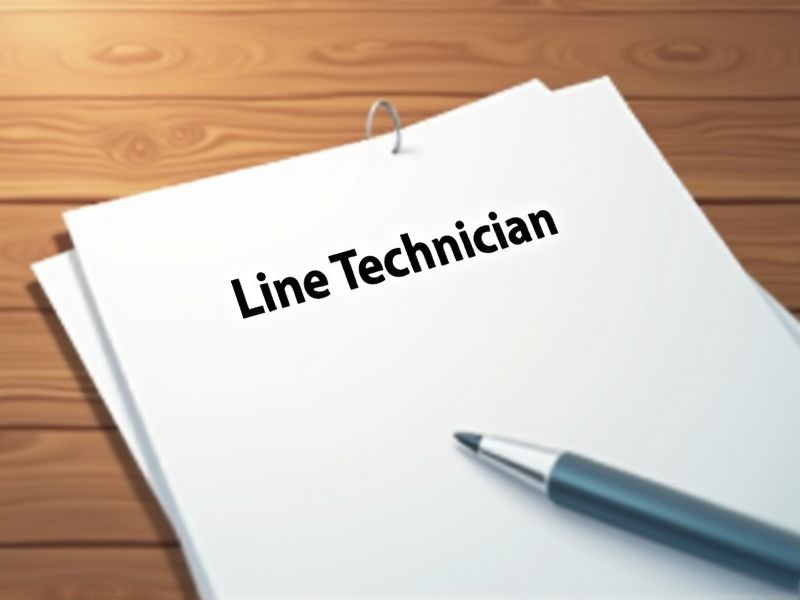
Line Technicians must handle complex electrical systems and ensure the safety of power grids, which demands a deep understanding of technical standards and safety protocols. Certifications serve as a formal recognition of an individual's expertise and capability to perform tasks effectively in this high-risk occupation. Regulatory bodies and employers often require these certifications to ensure compliance with industry standards and minimize safety risks. Here are some essential certifications you may need as a Line Technician.
OSHA 10-Hour Construction Safety and Health Certification
The OSHA 10-Hour Construction Safety and Health Certification provides line technicians with foundational knowledge of job site hazards, promoting safer working environments. Completion of this certification often results in reduced workplace accidents, which can lead to lower insurance premiums for employers. Many employers require this certification to ensure compliance with federal safety regulations, mitigating potential legal liabilities. Employers observe improved employee awareness and safer work practices, enhancing productivity and reducing downtime.
OSHA 30-Hour Construction Safety and Health Certification
The OSHA 30-Hour Construction Safety and Health Certification provides line technicians with essential knowledge about workplace safety standards, reducing the risk of accidents. This certification ensures that technicians are well-versed in recognizing and mitigating hazards specific to construction sites, which improves on-site safety for all workers. Line technicians often work in high-risk environments where understanding safety protocols can prevent serious injuries or fatalities. Employers benefit from certified workers as it leads to fewer incidents and potentially lowers insurance premiums.
NFPA 70E Electrical Safety Certification
NFPA 70E Electrical Safety Certification enhances a line technician's understanding of electrical hazards, which reduces workplace injuries. By ensuring compliance with safety standards, technicians minimize the risk of electrical accidents, which can significantly lower downtime. Companies are more likely to meet regulatory requirements, thereby avoiding costly penalties. Certified technicians are better equipped to implement best practices, leading to more efficient and safe operational procedures.
Electric Lineworker Certification
Electric Lineworker Certification is necessary because it ensures technicians possess the foundational skills required for safely handling high-voltage systems. Certification decreases the risk of accidents by enforcing standardized training that instills critical safety practices. Employers recognize certified line technicians as more competent, which enhances job prospects and career advancement. Certification also validates that a technician can efficiently restore power outages and maintain electrical infrastructure, important for community reliability.
Working at Heights Certification
A Line Technician often performs tasks above ground level, which increases the risk of falls and related injuries, thus mandating Working at Heights Certification to ensure safety. This certification provides essential training on fall prevention measures and the proper use of safety equipment, reducing potential accidents. Regulations require this certification to comply with industry standards and legal obligations, protecting both workers and employers. Having a certified workforce enhances a company's reputation and trustworthiness, leading to more contracts and job opportunities.
Confined Space Entry Certification
Confined Space Entry Certification ensures line technicians understand potential hazards like low oxygen levels or toxic gas exposure. This certification provides them with necessary skills to safely navigate and work in restricted spaces. It mandates compliance with safety regulations to minimize workplace accidents. Proper training and certification reduce liability for employers and increase technician safety.
Lockout/Tagout Certification
Lockout/Tagout (LOTO) certification is important for line technicians because it reduces the risk of equipment-related injuries by ensuring machinery is properly shut off before maintenance. Without this certification, technicians might inadvertently face hazardous exposures to unexpected equipment startups. The Occupational Safety and Health Administration (OSHA) mandates LOTO practices to enhance workplace safety standards. Achieving certification indicates a technician's understanding of critical safety protocols, promoting a safer work environment.
Arc Flash Awareness Certification
Arc Flash Awareness Certification is necessary for line technicians because it significantly reduces the risk of electrical injuries by ensuring they understand potential hazards. With a heightened awareness and knowledge of proper safety protocols, technicians are better equipped to prevent accidents in high-risk environments. This certification also promotes compliance with safety regulations and standards, which is crucial for maintaining safe operations. Greater awareness and preventative measures contribute to reduced downtime and potential financial losses from accidents.
CPR/First Aid Certification
Line technicians often face high-risk environments, making CPR/First Aid certification crucial for immediate response to emergencies. The high-voltage areas they work in pose a threat of electrical shocks, where timely CPR can save lives. Their remote work locations might delay professional medical assistance, so having certified technicians ensures that immediate care is available. Regulatory bodies and employers often require this certification to comply with safety standards and minimize workplace hazards.
Fall Protection Certification
Line technicians work at significant heights, increasing the risk of severe injury or fatality without proper protection. Fall Protection Certification provides them with essential knowledge and skills to mitigate these risks effectively. Regulatory bodies, such as OSHA, mandate fall protection training to ensure uniform safety standards across industries. Certification demonstrates compliance, which helps in reducing liability and improving workplace safety culture.
Summary
You can expect enhanced job prospects when Line Technicians obtain certifications, as they demonstrate verified skills and adherence to industry standards. Employers often recognize certified individuals for promotions and leadership roles, thereby increasing their career advancement opportunities. Certified technicians typically experience better salary potential due to increased expertise and reliability. This certification also helps ensure improved safety and efficiency in operations, directly influencing quality assurance and job satisfaction.
